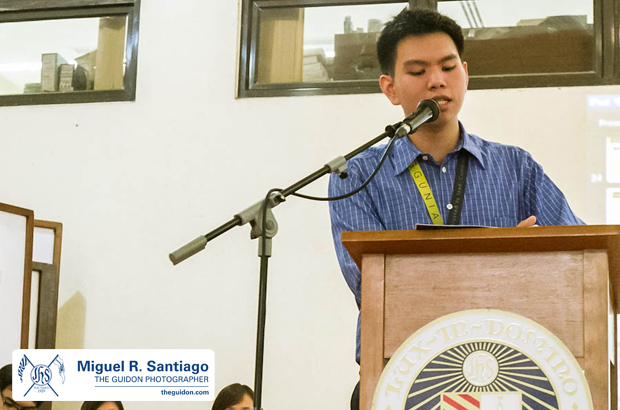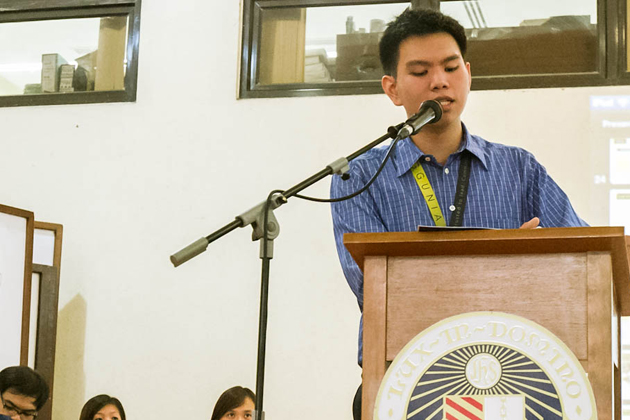
MORE PLANS AHEAD. The Sanggunian has planned out several activities for Ateneans as regards the upcoming national elections next year. Photo by Miguel R. Santiago.
SANGGUNIAN PRESIDENT Gio Alejo asserted that he was keen on reviving campus politics in his midyear report at the first ever State of the Sanggunian Address (SOSA) last November 19 at the Colayco Pavilion.
Alejo said that the student government is planning to begin this by holding a political affair before the Sanggunian General Elections next year, with the help of political science organization The Assembly.
“It will hopefully highlight the different public formations and ultimately, make the students choose,” said Alejo. “Not exactly to force them to choose, but to know where they stand.”
He added that Sanggunian officers are now in talks with faculty members, discussing how politicization can really be effective on campus. “Hopefully, the first step will really be in Sanggunian,” said Alejo.
However, in an interview with The GUIDON in August, Alejo said that he would not be able to focus on fixing party politics, given the multitude of matters dealt with by the Sanggunian.
In the same interview, Alejo even said that it was The Assembly’s job to fix party politics.
The Assembly has had similar plans since the start of the school year, as the organization is aiming to institutionalize party politics in the Ateneo.
Bringing the Sanggunian further
Alejo said that there were a lot of issues and politics at the start of the school year, and fixing all these is an “uphill climb.”
“I’m thankful that they [Sanggunian officers] accepted the challenge of trying to bring Sanggu further in terms of institutionalization and nation-building, and not forgetting the basic services we offer to students,” explained Alejo.
He also said that one of the things that made the Sanggunian accomplish what it did in the last semester was its clear sight of the goal.
“The most unexpected project was the Habagat operations last August,” said Alejo. “The last time a scale that big was done was during Ondoy, so it’s good that we were able to organize all our constituents and non-constituents as well… faculty, staff, [and] also administration [were] very supportive.”
Alejo also took pride in the projects that constituents might not have seen.
“I can say that there are some great projects inside Sanggu which the constituents might not really see but it’s really helpful in making Sanggu a stable organization. I think it really complements the things or projects that the students see,” he said.
The Sanggunian’s vision for the school year is to make the student body more active, more aware of issues and more responsive.
“We haven’t completely reached this,” said Alejo. “But I can say that we’re beginning to feel more and more presence of the students’ response, and they’re starting to be more engaged in the issues.”
Alejo also said that it’s good that University President Fr. Jose Ramon Villarin, SJ and some Ateneo faculty members are vocal about issues, “kasi nahahawa rin ‘yung estudyante na magsalita (because the students are also encouraged to speak) about the issues at hand.”
He added that it is these administrators’ and faculty members’ job to ensure an avenue for the students’ opinions on issues inside and outside of the university.
Alejo said that he is planning to establish a Sanggunian three-year development plan for the institutionalization of department offices, followed by other initiatives in the next two years.
The question of politics
In the open forum during the SOSA, Christian Union for Socialist and Democratic Advancement Agitation and Propaganda Minister Jorel Lising asked, “What I want to know is, what do these [Sanggunian projects] mean for the students? How do you define your politics?”
Alejo admitted that not all Sanggunian projects are political. “We should strike our balance: ensuring that services are given to our students and ensuring that political awareness inside and outside school is also given top priority.”
He noted that the primary difficulty lies in making students participative.
“Students are not very open when it comes to Sanggu projects of different kinds,” said Alejo. “So now, what we’re trying to do is to look at where students will be most interested in with regard to the different specializations and interests in their own school boards.”
“Not everything we do will be political because we are also in charge of providing services and basic needs for our constituents,” he said.
Involvement via social media
Loyola Schools freshmen have had different perceptions of the Sanggunian during their first semester in the Ateneo.
“Because of them [Sanggu], I always knew what was going on around school,” said communications technology management freshman Angela Yusingco.
“[I expect them to] get everyone more involved and aware about what’s happening,” she added.
Management economics freshman Thomas Go sees the Sanggunian as the mediator of the students. “I was affected by the Sanggunian in terms of having a mediator between us, students, and the leading heads of the Loyola Schools,” he said.
Alejo said that the Sanggunian is beginning to utilize community involvement through social media channels such as Facebook.
“It really provides an avenue for students to air their side even without formal fora like the SOSA. They’re free to air their sides and we’re able to absorb these,” he said.
“A lot of us are online [too] so we get to see how students feel about a certain issue, for example, and act on it as soon as possible so if there’s a problem, we can fix it, and if there’s something we can do about it, we can execute it as soon as possible.”
Onto the remainder
Sanggunian Block Representative Ace dela Cruz is looking at the second semester positively. “I just do hope that Sanggu will still continue what they have started. I look forward [hoping] that a lot of the things which they once mentioned during the last school year’s Miting de Avance be realized,” he said.
Meanwhile, Alejo said that the Ateneo community should expect the Sanggunian to be more responsive and to continue to be vocal about issues both inside and outside school.
“There will also be a lot more activities in store for students especially leading to the national elections,” he said.
Alejo promised that he would personally ensure that the next officers of the Sanggunian will be readier, stronger and more stable in terms of continuing the projects that they have started during their term.
“I also hope that the students will continue to respond. It’s a call-response thing,” added Alejo. “We call and ask for students to be active and I hope they [will] respond in any way that they can, not just for Sanggu but for [other] orgs as well.”
For the remaining term, the projects that will be carried out include the senatorial debates and mock national elections.
Editor’s Note: Jorel Lising is a member of The GUIDON’s Multimedia Staff. He had no involvement in the writing of this article.







